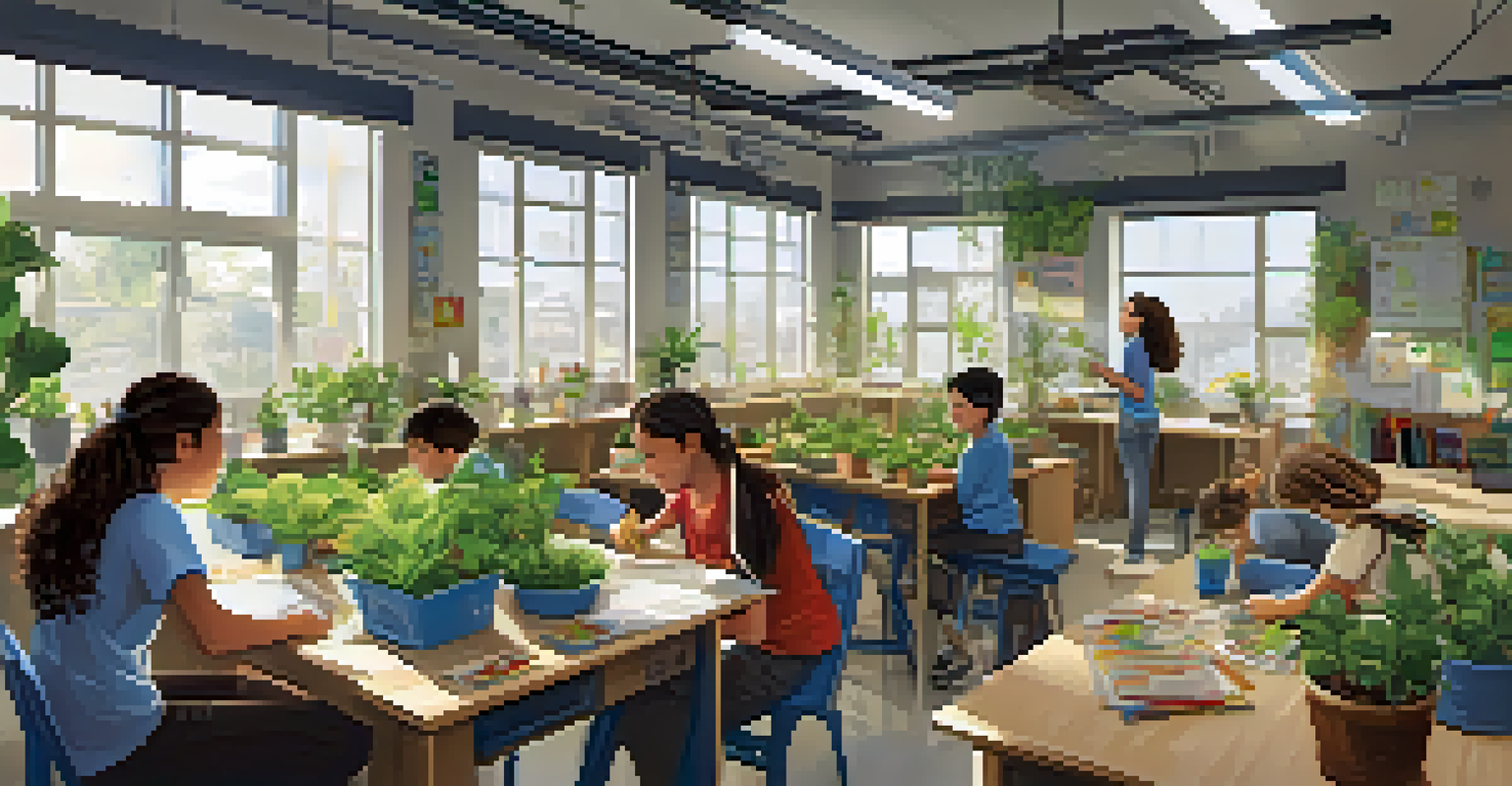Sustainability Education for Global Citizenship

Understanding Sustainability Education and Its Importance
Sustainability education equips individuals with the knowledge and skills to understand environmental, social, and economic challenges. It emphasizes the interconnectedness of these issues and encourages a holistic approach to problem-solving. By fostering a sense of responsibility, this education prepares individuals to make informed decisions that positively impact the planet.
The greatest threat to our planet is the belief that someone else will save it.
Imagine being a gardener who understands not just how to plant seeds, but also how to nourish the soil and protect local wildlife. Similarly, sustainability education nurtures a deep comprehension of how our actions influence global ecosystems and communities. This understanding is crucial for cultivating responsible global citizens who are aware of their impact.
Ultimately, when people grasp the significance of sustainability, they become advocates for change. They are more likely to support policies and practices that promote environmental health and social equity, contributing to a more sustainable future for everyone.
The Role of Global Citizenship in Sustainability
Global citizenship involves recognizing that we are part of a larger, interconnected world. It means understanding that our actions, no matter how small, can have a ripple effect across the globe. This perspective is vital in addressing sustainability, as many environmental and social issues transcend national borders.

For example, when a community reduces plastic waste, it not only benefits local ecosystems but also contributes to global efforts against pollution. Global citizens advocate for sustainable practices and policies that protect not just their own community, but the planet as a whole. This interconnected mindset fosters collaboration across cultures and regions.
Sustainability Education Empowers Change
By understanding the interconnectedness of environmental, social, and economic issues, individuals are better prepared to advocate for sustainable practices.
Sustainability education encourages individuals to think globally while acting locally. By cultivating a sense of global citizenship, we empower learners to take meaningful actions that resonate beyond their immediate surroundings, creating a more sustainable world for future generations.
Integrating Sustainability into Educational Curricula
To effectively nurture global citizenship, educational institutions must integrate sustainability into their curricula. This involves not only teaching about environmental issues but also encouraging critical thinking and problem-solving skills. By embedding sustainability across subjects, students can see its relevance in various contexts.
Education is the most powerful weapon which you can use to change the world.
For instance, a science class might explore renewable energy sources, while a history lesson could examine the impact of industrialization on the environment. These connections help students understand the multifaceted nature of sustainability. Moreover, hands-on projects and community involvement make learning more engaging and impactful.
When students actively participate in sustainability initiatives—such as school gardens or recycling programs—they gain practical experience. This experiential learning reinforces their understanding and commitment to sustainability, preparing them to become informed global citizens.
The Impact of Technology on Sustainability Education
In today's digital age, technology plays a pivotal role in enhancing sustainability education. Online resources, interactive platforms, and virtual simulations allow learners to access information and collaborate with others worldwide. This technology-driven approach fosters a deeper understanding of global sustainability issues.
For example, students can engage in virtual exchanges with peers in different countries to discuss local environmental challenges. They can share solutions and best practices, broadening their perspective and cultivating empathy. Such interactions help them realize that while geography may separate us, our challenges are often similar.
Global Citizenship Enhances Impact
Recognizing our role in a connected world encourages individuals to make local actions that contribute to global sustainability efforts.
Additionally, technology facilitates the dissemination of educational materials on sustainability. From online courses to webinars, learners can access a wealth of information that empowers them to take action. Embracing technology ensures that sustainability education remains relevant and accessible to all.
Community Involvement and Stakeholder Engagement
Community involvement is essential for effective sustainability education. Engaging local stakeholders—such as businesses, non-profits, and government agencies—creates a collaborative environment where diverse perspectives are valued. This approach enriches the learning experience and fosters a sense of shared responsibility.
Consider a local clean-up initiative that brings together students, parents, and community leaders. Not only does this event teach participants about environmental stewardship, but it also cultivates relationships and fosters a sense of belonging. When individuals feel connected to their community, they are more likely to advocate for sustainable practices.
Moreover, involving stakeholders in the educational process ensures that the curriculum reflects real-world issues. By addressing local challenges, learners are better equipped to contribute positively to their communities and, ultimately, to the global environment.
Encouraging Lifelong Learning in Sustainability
Sustainability education is not just a one-time event but a lifelong journey. Encouraging individuals to continuously seek knowledge about sustainability fosters a culture of curiosity and innovation. Lifelong learners are more likely to adapt to changing environmental conditions and contribute to ongoing solutions.
For instance, community workshops and online courses provide opportunities for individuals of all ages to expand their understanding of sustainability. Whether it's learning about urban gardening or renewable energy technologies, these resources empower people to take informed actions. This commitment to growth is crucial as we face evolving global challenges.
Lifelong Learning Fuels Progress
Emphasizing continuous education about sustainability helps cultivate informed citizens who are ready to tackle evolving environmental challenges.
By instilling a passion for lifelong learning, we cultivate a generation of global citizens who are equipped to drive positive change. This ongoing pursuit of knowledge ensures that sustainability remains a priority, not just for individuals, but for the communities they inhabit.
The Future of Sustainability Education and Global Citizenship
Looking ahead, the future of sustainability education will likely focus on collaboration and innovation. As global challenges intensify, educational institutions must adapt to equip learners with the skills needed to address these issues. This means embracing interdisciplinary approaches that combine knowledge from various fields.
Additionally, there will be a greater emphasis on experiential learning and community engagement. By connecting classroom lessons to real-world applications, students will gain a deeper understanding of sustainability's importance. This hands-on approach fosters a sense of agency and encourages proactive behavior.

Ultimately, the goal is to create a generation of informed global citizens who are passionate about sustainability. By continuing to prioritize this education, we can ensure that future leaders are equipped to navigate the complexities of our interconnected world while championing a sustainable future.